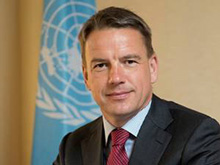UN Climate Chief Christiana Figueres
“Most fossil fuels should stay in the ground”
IN NOVEMBER 2013, UN climate chief Christiana Figueres addressed the World Coal Association (WCA) summit in Warsaw, Poland. (Her official title is Executive Secretary for the United Nations Framework Conference on Climate Change.)
Addressing the WCA was a gutsy thing to do. Because Figueres is an outspoken opponent of fossil fuel, the event was watched with great anticipation. She told the WCA the coal industry needs to start figuring out how to stop using coal in order to save the planet.
Among her key points: 1) Close all existing subcritical plants, 2) Implement safe CCUS (carbon capture use and storage) on all new plants, even the most efficient, and 3) Leave most existing reserves in the ground.
In essence, Figures was telling the WCA to plan for their own destruction. Understandably, the global coal industry did not take kindly to Figueres’ severe prescription, responding that Figueres didn’t understand the industry and her recommendations did not fit reality.
Today Figueres continues to push hard against fossil fuels. Like many within the Environmental Movement, she encourages groups to withdraw their investments from companies associated with oil, gas and coal. Such divestment, if widely adopted, would cause havoc in the valuation of energy companies, driving down their stock values, making it more difficult to obtain financing for new projects to reduce emissions (including the use of carbon capture, use and storage), potentially stranding billions of dollars in assets and resulting in the loss of tens of thousands of additional good blue collar jobs.
Moreover, there are the practical considerations of coalfired, baseload power, which is essential for peak electricity needs as well as the requirement for standby electricity when intermittent wind and solar power is simply not available.
Beyond those considerations is the moral question of denying poor nations, particularly in Africa and Asia, the opportunity to raise themselves out of poverty through affordable, plentiful and cheap coal-based energy.
As the top UN official most responsible for negotiating a global climate treaty, Figueres champions green energy even as she seeks to marginalize coal, oil and gas. Such biased treatment of one energy mix over another may play well to environmental activists, but it is likely to build resistance in fossil fuel industries — and make it more difficult to reach a workable agreement for responsible global climate action.
UN European economic head Christian Friis Bach
[+]Enlarge
Christian Friis Bach
“Engage the fossil fuel industry as part of the solution — instead of being seen as only part of the problems.”
I WILL ADMIT that just a few years back I was very skeptical. Today I am convinced that we must do it. We must capture the carbon dioxide emitted from burning fossil fuels.
Oil prices tumble. Coal resources are vast. Large new gas reserves have been found. Fossil fuels will be with us for many decades and will continue to underpin social and economic development around the world. We need to invest heavily in energy efficiency and in renewable energy sources, but the only way we can hope to limit global warming to less than two degrees [Centigrade] is to combine it with a significant expansion of the use of carbon capture and storage (CCS).
It can be done. The technology is feasible. It is expensive but it will be much more expensive not to do it. The [United Nations] IPCC Fifth Assessment Synthesis Report estimates that without CCS the cost of climate mitigation would increase by 138%. CCS technology should be developed and supported on a comparable basis with other no carbon or low carbon technologies.
This is the clear message from a set of new recommendations developed by the 56 countries in UNECE [which includes the United States, Canada and Israel] following extensive consultations with experts from around the world.
The recommendations emphasize that a post-Kyoto international agreement should accept a broad array of fiscal instruments to encourage CCS. It must address capturing and storing carbon dioxide from all industrial sectors, cement, steel, chemicals, refining and transportation. Governments must work together to sponsor and support multiple demonstration projects at scale. And carbon dioxide injected into reservoirs for enhanced hydrocarbon recovery should be treated and calculated as storage if stored permanently. This approach will promote economically viable solutions and make CCS an attractive solution. Measurement, reporting, and verification will be needed to establish that the CO2 is indeed permanently stored.
Together, these recommendations could bring the technology forward and provide economically attractive solutions and needed deep emissions cuts. And importantly the recommendations could, if implemented, engage the fossil fuel industry as part of the solution — instead of being seen as only part of the problem. This could change the political dynamics and help to shape a strong climate agreement in Paris.
That is what we need.
Editor’s note: This article by Christian Friis Bach first appeared as a blog titled “Capture the carbon” on the website of the United Nations Economic Commission for Europe. Mr. Bach is the UNECE Executive Secretary and UN Under-Secretary-General. Reprinted with permission.






